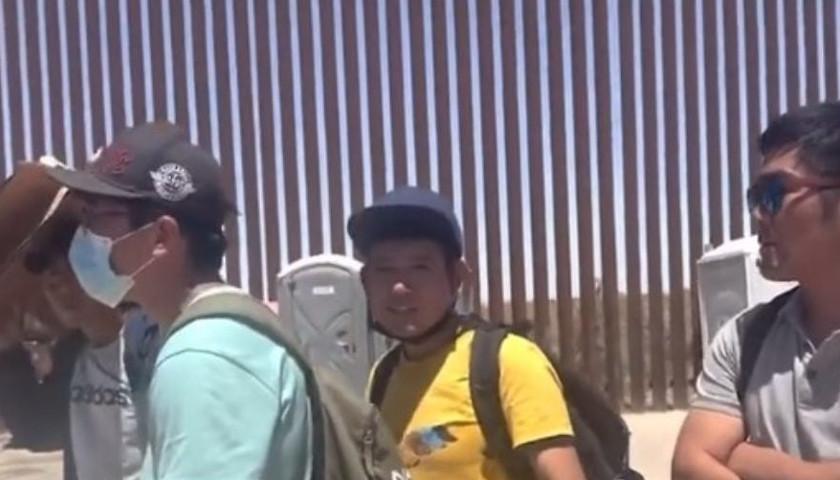Live from Music Row Thursday morning on the Tennessee Star Report with Michael Patrick Leahy – broadcast on Nashville’s Talk Radio 98.3 and 1510 WLAC weekdays from 5:00 a.m. to 8:00 a.m. – Leahy and all-star panelist Carol Swain were joined on the newsmakers line by Tennessee House Speaker Cameron Sexton.
During the segment, Leahy and Sexton discussed Governor Bill Lee’s recent decision to pass legislation that would allow refugees to settle into the state of Tennessee. The men discussed the protocol for such a decision and whether or not Tennessee’s General Assembly should have been privy to a meeting of the minds before Lee followed through. Sexton agreed that it probably would have been a good thing but that it wasn’t mandatory.
Swain added her thoughts to the situation by stating, ‘Well as a concerned citizen I’d like to say to you and the governor and anyone that’s listening that we would have far better policies if you all would sit down together and make these decisions on the basis of how it’s going to impact everyone in the state. Going forward, I would hope that that would be the case.’
Leahy: Yesterday, Tennessee Republican governor announced that the state of Tennessee will not stop resettling refugees even though Republican Lieutenant Governor Randy McNally and Speaker of the House Cameron Sexton said they disagree in a joint statement. Joining us on the line now, Speaker Cameron Sexton. Welcome, Speaker Sexton.
Sexton: Thank you for having me this morning.
Leahy: Your statement was quite definitive. Basically you said that our nation in the state of Tennessee has been extremely welcoming to immigrants in 2016. The general assembly adopted a resolution expressing the desire of our citizens to file a federal lawsuit to halt refugee resettlement in Tennessee.
Our opinion has not changed on this issue since legal action was taken and our personal preference would have been to exercise the option to hit the pause button on accepting additional refugees in the state. However, the federal order signed by the president makes this the decision by the governor and he’s made his call. When did the governor tell you he was going to make this decision Speaker Sexton?
Sexton: The governor never told us he was going to make that decision. We were told by staff or heard through the grapevine that he was leaning to make that decision. We never got word that he was making that decision.
I think we got a call a few hours before the letter was sent out to the media from his staff letting us know the direction that he was going. Then we got the letter like everybody else a few minutes before it went out to the media.
Leahy: As the leader of the House of Representatives, isn’t that a little unusual to communicate with you in advance about this?
Sexton: Well, I mean everybody communicates differently. That’s up to him and his administration and how he’d like to do that. I would say that what is unusual the two speakers that do a joint statement I think that sends a strong statement as well.
Leahy: I think the message is here, Gov. Lee is that we had a lawsuit going here. And Carol Swain who’s our all-star panelist in the studio with me has mentioned that she thinks that perhaps that the governor’s statement here that he’s going to accept refugees as he’s authorized to do under the executive order signed by the president is basically blown the Tennessee lawsuit out of the water. Do you think that’s correct or does it still have a chance in the federal courts?
Sexton: Well, I mean you know we’re researching that and I think there’s merit to her statement. If you have a lawsuit you want to halt it and then on the other end you now have the governor saying he wants to accept it. It makes sense that it could be harmful to the lawsuit. We’re kind of looking at it.
Leahy: Did you have any communication with the governor as he was trying to make his decision that if he were to not hit the pause button as it seems logical he would have done and not harmed the lawsuit. Did you say, governor if you do that it will possibly hurt our lawsuit? Did you have an opportunity to communicate that to him?
Sexton: I didn’t. I think there were a lot of other members who had reached out to him and his staff and Lieutenant Governor McNally and myself reached out to his staff as well to let them know that when we started hearing he was leaning to accepting.
We never really had a conversation where he picked up the phone and said hey let’s have a conversation about what we want to do. He has the authority to do this and he’s made his call. Honestly, we’re disappointed in it for a multitude of reasons why we think this will not be the right direction to go.
Leahy: My understanding is that the executive order was a fulfillment of the president’s campaign promise where he said that refugees could not come into the state or locality without the approval of the local government. One element of that was to get the governor to approve it.
But in other states where this is going on like North Dakota, also counties have voted on this. And some of them said yes. And some have said no. Do you think that might be a possibility here in Tennessee for counties to hold votes? For the county commission to say, the governor can say that but we don’t want them in Williamson County or Rutherford County. Is that a possibility in your mind as you understand this?
Sexton: Yeah, I think that is a possibility. And there’s legislation already in the process of being filed. We’ll run down that until next year. The interesting thing about the governor’s letter too is that there is no date of when he’s going to start. So we don’t really understand when the starting state is going to be.
He said a year but we don’t know what that date is. That’s unclear. But I think the general assembly will have some opportunities to see what direction we want to go as we move forward. We’re researching this over. We’ve got about six weeks.
Leahy: Now I’m going to characterize this as the governor’s lack of consideration of the views of the Tennessee General Assembly before making this decision. Is this going to have a positive or negative effect on the governor’s agenda when the state legislature comes back into session in January?
Sexton: It’s hard to say. There were a lot of members who were very upset. Will they see this as one issue, I think that on similar topics whether its something from immigration or other things they’re going to take a harder look at it. I think legislation will potentially bee a little bit scrutinized this year.
And I would say even with the issue. About three weeks ago the governor’s office and DHS came out to list about $3 million that they wanted to spend on people. And the interesting thing about the refugees is when they come into the state, they’re automatically available to get that government programs assistance and be on TennCare.
Which unfortunately some Tennesseeans aren’t qualified but these individuals can be immediately qualified. So we’re going back and looking at and see if there’s a link to this decision that was made yesterday to the announcement they made a few weeks ago to see if there hedging the bet. Or if they were trying to use the money to build up in anticipation of this situation.
Leahy: That’s a very interesting point. Carol Swain who’s our all-star panelist in the studio with me this morning has a question for you.
Swain: For the governor not to have a sit-down meeting to inform the body in advance how he was leaning. Because decisions of this importance ought to be talked out with all the stakeholders.
Sexton: I completely understand what you’re saying. You know it’s one of those things that the governor has the authority to let us know or not let us know. Just like we have the authority on whether or not we pass bills or not without consultation.
All I can say is that we try to communicate the best we can and as open as we can and hopefully, that’s returned to us on the other side as we look at this. Everybody is compassionate but we’re also trying to protect Tennesseeans.
Swain: Well as a concerned citizen I’d like to say to you and the governor and anyone that’s listening that we would have far better policies if you all would sit down together and make these decisions on the basis of how it’s going to impact everyone in the state. Going forward, I would hope that that would be the case.
Sexton: I hope so. As I’ve learned is that working with the Senate and having an understanding and getting to a consensus sometimes we can’t get there and we just disagree. But more times than not you can get to a place where everybody’s voices are heard.
And you make the best decision you can. And sometimes somebody I’m going to make this decision anyway. I don’t know if that’s exactly what would have happened here or not if that would have happened.
Leahy: When does the Tennessee General Assembly come back in session? January? What date are you back in session?
Sexton: We come back at noon on January 14. That’s when we start. The bill filing deadline is going to be February the 5th. So there’s about a four week period in there where members can file legislation. I think that’s going to be a couple of days after as well. Members will have plenty of time to file legislation.
Listen to the third hour here:
– – –
Tune in weekdays from 5:00 – 8:00 am to the Tennessee Star Report with Michael Patrick Leahy on Talk Radio 98.3 FM WLAC 1510. Listen online at iHeart Radio.
Photo “Bill Lee” by Bill Lee.






[…] month, Speaker Sexton joined the Tennessee Star Report with Michael Patrick Leahy to weigh in on Governor Lee’s decision to allow refugees into Tennessee. At the time, Speaker Sexton, who was […]
[…] Read More […]